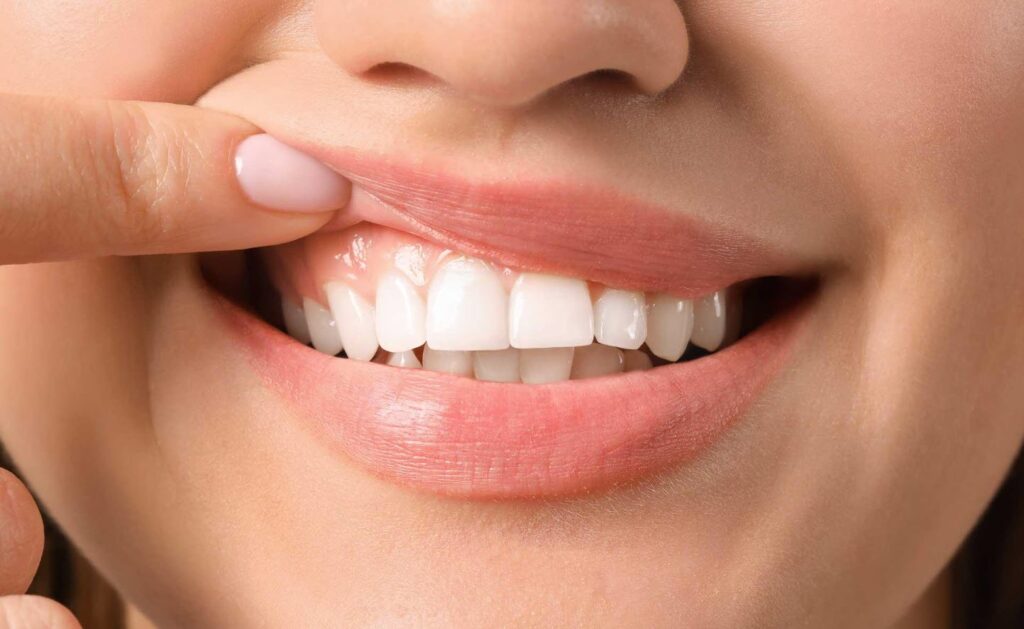There’s a lot that we can do from the outside to get our teeth squeaky clean with brushing, flossing, tongue cleaning, oil pulling, and other methods, but beyond the surface, good oral health starts from within, and we can improve its state with what we eat. If you’re thinking about the best food for oral health, here are a few foods to incorporate into your diet for healthier gums and stronger teeth.
1. Berries
Blueberries, cranberries, blackberries, goji berries, strawberries—any deeply colored fruit is a great food for oral health because it’s high in antioxidants, which strengthen the cells of your body in order to protect against gum disease and tooth decay.
These antioxidants combat free radicals, which are the unstable molecules that damage cells and contribute toward aging and disease. Just be sure to brush after consuming berries, as their dark juices can leave stains behind on your teeth.
Great food for oral health includes berries, leafy greens, and nuts.
2. Fermented Foods
Fermented foods like natto and miso contain nutrients that are vital for dental health: calcium and Vitamin K2.
Contrary to popular belief, you can get plenty of calcium from a plant-based diet without requiring dairy products. Calcium is critical for dental health and development, and Vitamin K2 keeps the calcium in your bones and teeth, directing it to where it should go to prevent the calcification of the arteries.
3. Mushrooms
Mushrooms are an excellent source of Vitamin D (they create their own when left out in the sun), which helps us absorb calcium and keep teeth strong. A Vitamin D deficiency can cause 30-80 percent of calcium to go right through you, so it’s important to get some sun and enjoy foods that contain this sunshine vitamin.
4. Almonds
Almonds are another source of calcium, making them an ideal food for oral health, but they’re also high in phosphorus, a micronutrient that needs to be in balance with calcium. Phosphorus deficiencies can lead to fragile teeth and poor bone development (making it a critical factor for children).
5. Cucumber
Hydrating cucumber is full of Vitamin C, another key nutrient for oral health. Our bodies do not make or store Vitamin C, so it’s important that we get it from our diet. It supports the natural production of collagen, the protein that essentially holds us together and is healing for the gums.
Preparation tip: the Vitamin C content begins to deplete as soon as the cucumber is cut, so make sure you use them as quickly as you can after chopping or slicing.
6. Fibrous Foods
Foods with a high amount of fiber massage your gums and teeth while you chew. While these foods are no replacement for brushing teeth, their natural abrasiveness does help some of the cleaning along, and all the extra chewing they require can help neutralize certain bacteria (like Streptococcus mutans, which causes cavities). Plus, foods like raw celery, apples, and carrots contain beneficial nutrients for bone health on top of their cleansing qualities.
7. Walnuts
Walnuts are a great food for oral health because they’re rich in omega-3 essential fatty acids (EFAs), named “essential” because our bodies do not produce omega-3s on their own, so it is essential that they come from our diet. These EFAs are important for strengthening the mucosal cells and connective tissue in our mouths.
The Bottom Line
Getting healthier gums and teeth does not have to include a costly trip down the dental hygiene aisle at the drugstore. The key to improved oral health can very well be in the produce section instead. With a well-rounded diet filled with brightly colored, whole fruits and vegetables, as well as nuts, seeds, and more, you’ll know that your body is getting the nutrients it needs to keep your mouth happy.


